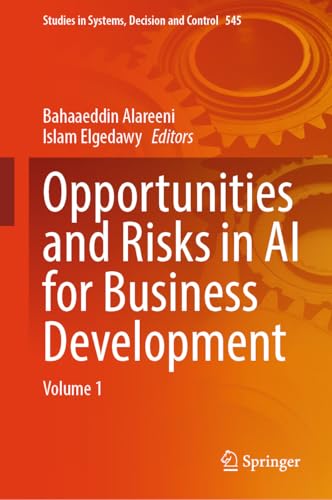
Opportunities and Risks in AI for Business Development: Volume 1
Bahaaeddin Alareeni, Islam Elgedawy
Publisher
Springer
Publication Date
8/22/2024
ISBN
9783031652035
Pages
1837
Categories
Questions & Answers
The integration of AI technologies is revolutionizing the business landscape by automating tasks, enhancing decision-making, and creating new opportunities. Key opportunities include increased efficiency, improved customer experiences, and the ability to analyze vast amounts of data for insights. AI can optimize supply chains, personalize marketing, and streamline operations, leading to cost savings and competitive advantages.
However, risks are also present. These include job displacement, ethical concerns, and potential biases in AI algorithms. There's also the challenge of ensuring data privacy and security, as well as the need for continuous monitoring and updating of AI systems to maintain their effectiveness and safety. Overall, while AI offers significant benefits, businesses must navigate these risks carefully to maximize the potential of AI in a responsible and sustainable manner.
Successful AI implementation in business hinges on several critical factors. First, strategic foresight is crucial, enabling organizations to anticipate future trends and adapt their strategies accordingly. Dynamic capabilities like strategic agility and flexibility are also vital, allowing businesses to respond swiftly to new opportunities and challenges. Data quality and accessibility are essential for AI systems to function effectively, while employee training and support ensure that staff can utilize AI tools efficiently.
To prepare for the AI transition, organizations should:
- Invest in Training: Provide comprehensive training for employees to understand and work with AI technologies.
- Develop a Clear Strategy: Align AI initiatives with business goals and ensure they contribute to overall strategic objectives.
- Focus on Data Infrastructure: Ensure data is clean, accessible, and well-organized to feed AI models effectively.
- Cultivate a Culture of Innovation: Encourage experimentation and risk-taking to foster a supportive environment for AI adoption.
- Collaborate with Experts: Partner with AI specialists and consultants to navigate the complexities of AI implementation.
Businesses can leverage AI to enhance customer experiences and drive innovation by integrating AI into various aspects of their operations. AI can personalize customer interactions, streamline processes, and offer predictive insights. However, addressing ethical concerns and data privacy is crucial. Here are some strategies:
-
Ethical AI Development: Ensure AI systems are designed with fairness, transparency, and accountability in mind. Implement guidelines to prevent biases and ensure AI decisions align with ethical standards.
-
Data Privacy: Adhere to data protection regulations like GDPR and implement robust data security measures. Use anonymization and encryption to safeguard customer data.
-
Customer Consent: Obtain explicit consent for data collection and use, and provide clear information on how data is utilized.
-
Transparency: Make AI decision-making processes transparent to customers, allowing them to understand how AI impacts their interactions.
-
Continuous Monitoring: Regularly assess AI systems for biases, errors, and ethical concerns, and make necessary adjustments.
-
Collaboration: Engage with stakeholders, including customers, to understand their concerns and expectations regarding AI usage.
By combining AI's potential with ethical considerations and data privacy measures, businesses can create a positive, innovative customer experience.
Strategic foresight and agility are crucial in navigating the evolving landscape of AI. Strategic foresight enables businesses to anticipate future trends and challenges, allowing them to make informed decisions and stay ahead of the curve. It involves understanding the potential impact of AI on various aspects of the business, including operations, customer experience, and competitive landscape.
Agility, on the other hand, is essential for adapting to rapid changes. It allows businesses to pivot quickly, respond to new opportunities, and mitigate risks. By fostering a culture of agility, organizations can foster innovation, encourage experimentation, and empower employees to make decisions that drive growth.
To stay competitive in a rapidly changing environment, businesses should:
- Invest in AI education and training to build a skilled workforce.
- Foster a culture of innovation and continuous improvement.
- Develop strategic foresight by monitoring industry trends and engaging with thought leaders.
- Implement agile methodologies to facilitate rapid adaptation and decision-making.
- Collaborate with partners and stakeholders to leverage diverse perspectives and resources.
Governments and regulatory bodies can support responsible AI development and deployment through several strategies:
-
Establish Clear Regulations: Develop comprehensive regulations that address ethical concerns, data privacy, and bias in AI systems. These should include guidelines for transparency, accountability, and fairness.
-
Promote Research and Development: Allocate funding for research into AI ethics, safety, and governance. Encourage collaboration between academia, industry, and government to foster innovation.
-
Create Standards and Certifications: Develop industry standards for AI systems, including best practices for design, testing, and deployment. Offer certifications to ensure compliance with these standards.
-
Educate and Train: Implement programs to educate the public and professionals about AI risks and benefits. This includes training for AI developers and users on ethical considerations and responsible practices.
-
Encourage Public Engagement: Facilitate public dialogue on AI to ensure diverse perspectives are considered in policy-making. This can help build trust and ensure that AI benefits society as a whole.
-
Monitor and Evaluate: Establish mechanisms to monitor AI systems for potential risks and unintended consequences. Regularly evaluate the impact of AI on various sectors and public interests.
-
International Cooperation: Collaborate with other countries to develop global norms and standards for AI, ensuring a level playing field and addressing cross-border challenges.